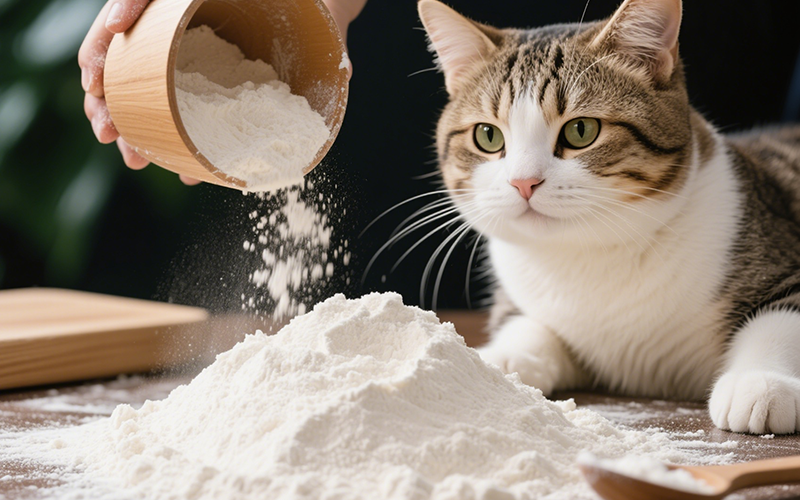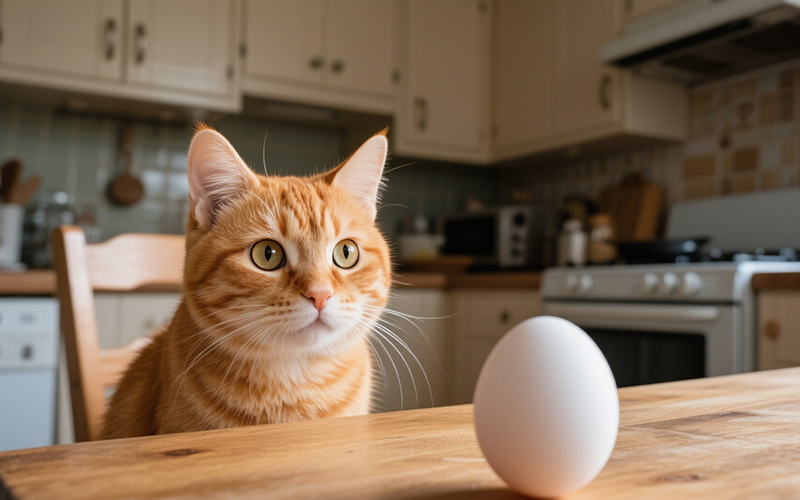Can Cats Eat Flour? What You Need to Know About Cats and Flour
- 10 Apr 2025 15:10
As a cat parent, you may have wondered if it’s safe for your feline friend to eat flour. Whether it's a small bit of dough or the flour from a counter, it’s understandable to be curious about what’s safe for your cat to consume. Let’s break down whether cats can eat flour and what potential risks you should be aware of. 🐱

Can Cats Eat Flour?
In short, flour is not toxic to cats, but it's not something you should intentionally feed them. While small amounts of flour are unlikely to harm your cat, it doesn’t offer any nutritional benefits. Flour is a carbohydrate, and cats, being obligate carnivores, have little need for carbs in their diet. Instead, they thrive on animal-based proteins, fats, and specific nutrients like taurine that are found in meat. 🐾
Here are some reasons why flour is not a great choice for your cat:
Why Flour is Not Ideal for Cats
Lack of Nutritional Value: Flour contains mostly carbohydrates, which cats do not need in large quantities. Cats get their energy from protein and fat, not from carbs. Flour provides no essential nutrients like taurine, vitamin A, or other nutrients that cats require for good health.
Digestive Issues: Cats are not designed to digest large amounts of carbohydrates. Eating too much flour could potentially cause digestive upset, including diarrhea or bloating. 🐾
Possible Dough Risk: If you’ve ever baked with yeast dough, you may know that it can rise and expand. If your cat consumes raw dough, there’s a risk of it expanding in their stomach, which could cause discomfort or even serious health issues. Additionally, raw dough may contain yeast, which can ferment in your cat’s digestive system and cause alcohol poisoning. 🥖
Gluten Sensitivity: Some cats might be sensitive to gluten, a protein found in wheat flour. While this is not common, it could cause gastrointestinal upset or allergic reactions in some cats.
What Happens if Your Cat Eats Flour?
If your cat eats a small amount of flour, it is unlikely to cause harm immediately. However, eating larger quantities of flour or dough regularly could lead to digestive problems or weight gain, as the carbs aren’t something their bodies need. If your cat consumes raw dough or yeast-based dough, it’s best to monitor them closely for any signs of distress and seek immediate veterinary attention if needed.
What to Do if Your Cat Eats Flour
If your cat has consumed a small amount of flour, keep an eye on them for any signs of stomach upset, such as:
Vomiting
Diarrhea
Lethargy
Abdominal pain or bloating
If you notice any unusual behavior or symptoms, it’s always a good idea to consult a pet health professional for advice. For quick guidance, PettureX can provide 24/7 online consultations and help you address any concerns you might have. 📱
Safe Alternatives to Flour for Your Cat
If you’re looking for safe and healthy snacks or meals for your cat, here are some great alternatives:
Cooked Meat: Cats love meat, and it’s the best option to provide them with the protein and nutrients they need. Plain cooked chicken, turkey, or beef without any seasoning is a great choice. 🍗
Tuna or Salmon: A small serving of canned tuna or salmon (in water, not oil or brine) can be a tasty and healthy treat for your cat. 🐟
Cat-Specific Treats: There are many cat treats available that are designed to meet their dietary needs. These treats can provide additional vitamins and nutrients without the risk of digestive upset. 🍖
Eggs: A small portion of scrambled or boiled eggs can be a great protein-rich snack for your cat. Make sure they’re cooked thoroughly, without any added salt or seasonings. 🥚
Final Thoughts: Can Cats Eat Flour?
While a small amount of flour won’t harm your cat, it’s not a beneficial food for them. Flour is high in carbohydrates and doesn’t provide the nutrients cats need for optimal health. Instead of flour, focus on providing your cat with high-quality cat food, meats, and treats that meet their specific dietary needs.
If you ever have questions about your cat’s health or diet, PettureX is a helpful resource! PettureX offers 24/7 online consultations and pet image recognition to help you monitor your cat’s well-being and provide expert guidance when you need it. 🧑💻
By keeping your cat on a balanced, meat-based diet, you’ll ensure they stay happy, healthy, and energized! 😻
Related

Can Cats Eat Egg Yolk Raw? A Vet's In-Depth Guide to Feline Nutrition & Safety
- 10 Jun 2025
Can Cats Eat Dog Kibble? Unpacking the Nutritional Mismatch!
- 29 May 2025
Can Cats Eat Deli Turkey? Slicing Through the Facts for Your Feline!
- 29 May 2025
Can Cats Eat Deer Meat? Exploring Venison for Your Feline!
- 28 May 2025
Can Cats Eat Corned Beef? Unpacking This Salty Human Delicacy!
- 28 May 2025
Can Cats Eat Cooked Rice? The Grain Truth for Your Feline Friend!
- 27 May 2025
Can Cats Eat Cornbread? A Crumb of Truth for Curious Cat Owners!
- 27 May 2025
Can Cats Eat Cooked Meat? Sizzling Facts for Your Feline's Feast!
- 26 May 2025
Can Cats Eat Chili? Spicing Up the Truth About This Human Dish!
- 26 May 2025
Can Cats Eat Chicken Eggs? Cracking the Code on This Feline Food Query!
- 24 May 2025
